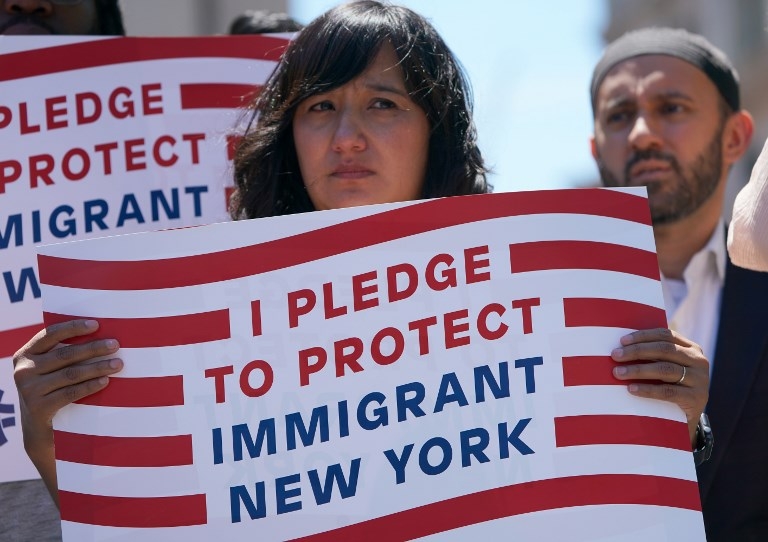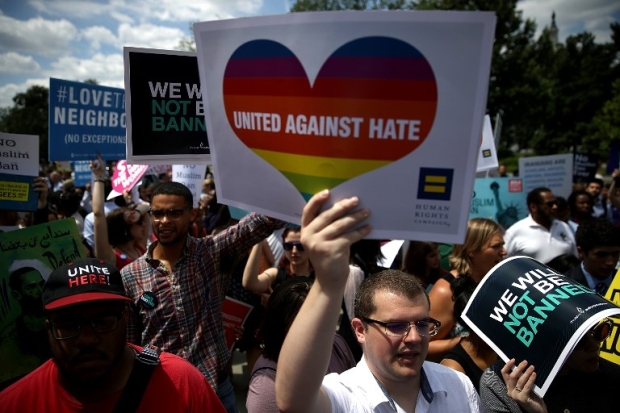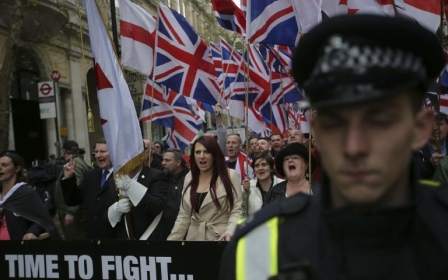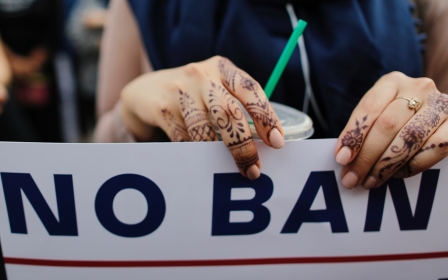Will Americans stand up against Trump’s Muslim ban?

Earlier this month, Americans celebrated the fourth of July, marking the country’s independence. It celebrates the Declaration of Independence, adopted on 4 July 1776, when the 13 US colonies declared themselves independent from the British Empire.
In the minds of many, it is about freedom and equality - but defining what these concepts mean invites social division.
The off-cited words of the Declaration’s preamble are definitely stirring: “We hold these truths to be self-evident, that all men are created equal, that they are endowed by their creator with certain unalienable rights, that among these are life, liberty and the pursuit of happiness.”
Despite the foregoing and the “Give me your tired, your poor” invitation of Lady Liberty, Americans have long been fractured over who and what a patriot is or should be.
Zero tolerance
This tension is all the more evident now as we see images of immigrant families being torn apart, African-Americans marginalised, and bigoted pronouncements about Muslims from “the land of the free and home of the brave”.
As a Canadian Muslim of Indian origin doing business in the US on a NAFTA visa, it would be an understatement for me to say that times have changed. Being a brown Muslim on a visa targeted by the Trump administration makes me nervous every time I cross the border.
It is not courage to speak out against past injustices while upholding or facilitating similar conduct today
We have recently been witnessing the inhumane effects of the zero tolerance immigration policy. The sight of children being torn from parents and jailed in cages is clearly not the US most of us thought we would live to see.
Many of us also watched in disbelief as the US Supreme Court upheld the Trump administration’s “travel ban” in Trump v Hawaii. The direction that the country appears to be headed is even more troubling for me now, as the father of two American Muslim children.
The highest court’s decision to uphold what is commonly known as the “Muslim travel ban” was nothing short of religious prejudice cloaked in the garb of national security.
Yes, claims of national security and racial/religious discrimination are often intertwined. The US is not alone in this, but the US is different and must be held to a higher standard, because it was ostensibly established as a home for those fleeing discrimination based on religious and other differences.
Shameful hypocrisy
As Americans reflect during this critical time, it is incumbent that they take a step back and reassess where their great country is headed.
The majority and minority opinions from the Supreme Court in the “travel ban” case can help in this process. The similarities between the shameful Korematsu case, when Japanese Americans were rounded up and detained in internment camps, and the Muslim “travel ban” decision provide much food for thought.
The majority opinion in Hawaii noted that the Korematsu decision, in which the Supreme Court majority sided with the government, was gravely wrong and “has no place in law under the Constitution”. Brave words indeed from Chief Justice John Roberts.
As Justice Sonia Sotomayor pointed out for a minority of the bench, there are numerous parallels between the Japanese internment case and the “travel ban” case: “As here, the government invoked an ill-defined national security threat to justify an exclusionary policy of sweeping proportion … As here, the government was unwilling to reveal its own intelligence agencies’ views of the alleged security concerns to the very citizens it purported to protect.
"And as here, there was strong evidence that impermissible hostility and animus motivated the government’s policy.”
In both the Japanese internment case and the "travel ban" case, the Supreme Court uncritically accepted the government claim that the conduct was “facially neutral”. Thankfully, in both cases, the efforts to mask racism or religious bigotry did not go unopposed.
As Sotomayor and other minority justices did in the "travel ban" case, Justice Frank Murphy in the Korematsu case called out the Japanese internment as being based on what he called an “erroneous assumption of racial guilt” rather than "bona fide military necessity". Murphy bluntly and bravely labelled the government conduct as the "legalisation of racism".
Ignoring the lessons of history
History only benefits us if we learn from it. Sadly, it appears that Americans are ignoring the lessons.
In what seems prophetic now, Murphy also warned in his Korematsu dissent that if the Supreme Court sanctioned such suspicion and hatred, it would “encourage and open the door to discriminatory actions against other minority groups in the passions of tomorrow”.
To my American friends, students, neighbours and colleagues, I ask: will you learn from history and take steps to avert shameful deviations from your founding principles?
Will you stand up for the ideals and values that actually made this country great? Will you guarantee that my American children will have the same rights and freedoms as the rest of you?
I know the answers I expect from those of you I have encountered over the last nine years as I commuted between Canada and the US. Indeed, the US I know was evident this past weekend, as hundreds of thousands of Americans across the country marched to protest the heartless immigration policy.
The Americans I have come across are some of the kindest, most principled and fair-minded people I have ever had the good fortune of meeting. I call on these Americans to encourage their fellow citizens to consider these questions through the lens of both the letter and spirit of the Declaration and the Constitution.
It is now more important than ever to take a few moments to reflect on what should really make the US unique in the eyes of many: freedom, liberty and equality for all.
- Faisal Kutty is counsel to KSM Law, an associate professor at Valparaiso University Law School in Indiana and an adjunct professor at Osgoode Hall Law School of York University in Toronto. He served as Islamic culture and practice consultant for the CBC's award-winning sitcom The Little Mosque on the Prairie.You can follow him on Twitter @faisalkutty
The views expressed in this article belong to the author and do not necessarily reflect the editorial policy of Middle East Eye.
Photo: Members of the New York Immigration Coalition hold a news conference after the US Supreme Court upheld US President Donald Trump's Muslim ban on 26 June 2018 (AFP)
Middle East Eye propose une couverture et une analyse indépendantes et incomparables du Moyen-Orient, de l’Afrique du Nord et d’autres régions du monde. Pour en savoir plus sur la reprise de ce contenu et les frais qui s’appliquent, veuillez remplir ce formulaire [en anglais]. Pour en savoir plus sur MEE, cliquez ici [en anglais].






